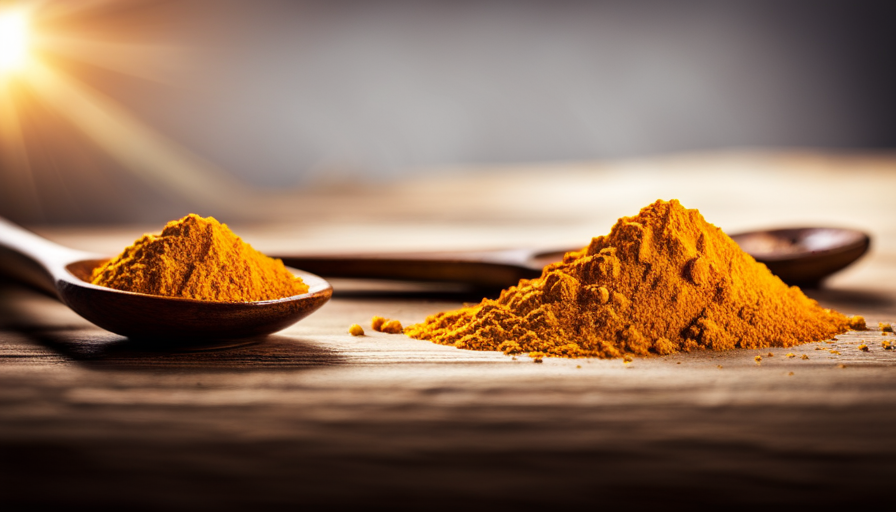I have always been a tea enthusiast and constantly searching for ways to enhance its health benefits. This is why I was fascinated when I discovered the idea of incorporating turmeric into my tea.
Turmeric is a spice that comes from the turmeric plant, which is native to Southeast Asia. It has a bright yellow color and a distinct, slightly bitter taste. Turmeric contains a compound called curcumin, which has been shown to have powerful anti-inflammatory and antioxidant properties.
Research has linked curcumin to a range of health benefits, including improved brain function, reduced risk of heart disease, and even a lower risk of cancer. By adding turmeric to your tea, you can take advantage of these health benefits while enjoying a warm, comforting drink.
So, can you add turmeric to tea? The answer is yes, and in this article, we’ll explore why you might want to do so.
Key Takeaways
- Turmeric is a spice from Southeast Asia that contains curcumin, a compound with anti-inflammatory and antioxidant properties.
- Tea, such as green tea, herbal tea, black tea, and chai tea, offers various health benefits like improved brain function, heart health, and reduced inflammation.
- Turmeric can be added to different types of tea, and fresh turmeric root and other spices like cinnamon and ginger can enhance flavor and properties.
- Drinking turmeric tea regularly can improve cognitive function, memory, and mood, but precautions must be taken as excessive consumption can cause side effects and interact with certain medications. It is recommended to speak with a healthcare professional before adding turmeric to the diet.
What is Turmeric and Its Health Benefits
You’ve probably heard of turmeric and its amazing health benefits. This bright yellow spice has been used for centuries in Ayurvedic medicine, and it’s now gaining popularity in the mainstream health and wellness community.
Turmeric contains a powerful compound called curcumin, which has anti-inflammatory and antioxidant properties. It’s been shown to help with a variety of health issues, including joint pain, digestive problems, and even depression.
One popular way to incorporate turmeric into your diet is by making a turmeric latte. This delicious drink is made with turmeric, milk (or a dairy-free alternative), and a sweetener of your choice. You can also take turmeric supplements if you don’t enjoy the taste of turmeric in your food or drinks.
Adding turmeric to your tea is another great way to get the health benefits of this spice. But before we get into the types of tea that go well with turmeric, let’s take a closer look at why you should consider adding it to your diet.
Types of Tea to Add Turmeric
When it comes to spicing up your daily cuppa, there are various types of tea that pair perfectly with the vibrant and earthy flavor of turmeric. Green tea and herbal tea are great options for those who want to enjoy the health benefits of turmeric without the caffeine. Green tea contains antioxidants and has been shown to improve brain function and lower the risk of some types of cancer. Herbal teas, such as chamomile and peppermint tea, are caffeine-free and offer a range of health benefits, including improved digestion and reduced inflammation.
On the other hand, if you’re looking for a bolder and more robust flavor, black tea and chai tea are excellent options to add to your turmeric-infused tea. Black tea contains caffeine and has been shown to improve heart health and reduce the risk of stroke. Chai tea, which is a blend of black tea and spices such as cinnamon, cardamom, and ginger, is a popular choice for those who enjoy a spicy and warming beverage. Adding turmeric to your tea can enhance its flavor while also providing a range of health benefits.
In the next section, I’ll share some tips on how to add turmeric to your tea to get the most out of this powerful spice.
How to Add Turmeric to Tea
When it comes to adding turmeric to tea, there are a few key points to consider. First, you can use either turmeric powder or fresh turmeric root depending on your preference.
Second, you might want to experiment with adding other spices like ginger or cinnamon to enhance the flavor and health benefits of your tea.
Lastly, adding sweeteners like honey or milk can also help balance the bitterness of turmeric and make your tea more enjoyable.
Turmeric Powder vs. Fresh Turmeric Root
If you want a more authentic taste, try using fresh turmeric root instead of turmeric powder in your tea. Not only does it add a unique flavor, but it also offers additional health benefits.
Here are some reasons why you should consider using fresh turmeric root in your tea:
-
Longer shelf life: Fresh turmeric root can last up to three weeks in the refrigerator, while turmeric powder can lose its potency over time.
-
Higher curcumin content: Curcumin is the active ingredient in turmeric that provides its health benefits, and fresh turmeric root contains a higher concentration of curcumin than turmeric powder.
-
Better absorption: Curcumin is better absorbed by the body when consumed with black pepper, and using fresh turmeric root allows you to add black pepper to your tea more easily.
-
Reduced risk of contamination: Turmeric powder can sometimes be contaminated with lead, so using fresh turmeric root can help ensure that you’re consuming a safe and healthy beverage.
Incorporating fresh turmeric root into your tea can greatly enhance its taste and offer additional health benefits. However, if you prefer using turmeric powder, you can still add other spices to your tea to elevate the flavor.
Adding Other Spices
To really elevate the flavor of your turmeric tea, try incorporating other spices like cinnamon or ginger. These spice combinations not only taste amazing but also offer a whole host of health benefits.
Cinnamon, for example, can help regulate blood sugar levels and reduce inflammation, while ginger has been shown to aid in digestion and relieve nausea. Adding these spices to your turmeric tea can also help increase the antioxidant and anti-inflammatory properties.
This can lead to improved overall health and wellness, as these properties have been linked to a reduced risk of chronic diseases such as heart disease and cancer. So, why not try experimenting with different spice combinations to find your perfect cup of tea?
Moving onto the next section, another way to customize your turmeric tea is by adding sweeteners and milk.
Sweeteners and Milk
Now that we’ve talked about adding other spices to tea, let’s move on to sweeteners and milk alternatives.
If you’re looking to add some sweetness to your tea, there are several options to choose from. Honey, maple syrup, agave nectar, and stevia are all popular natural sweeteners that are commonly used in tea. These sweeteners not only add flavor but also provide various health benefits, such as antioxidants and anti-inflammatory properties.
If you prefer to add milk to your tea, there are also many alternatives to traditional cow’s milk. Almond milk, coconut milk, soy milk, and oat milk are all great options that provide a creamy texture without the lactose and cholesterol found in cow’s milk. These milk alternatives also contain essential vitamins and minerals, such as calcium and vitamin D, that are important for overall health and wellness.
Moving on to the benefits of drinking turmeric tea, this powerful spice has been used for centuries in traditional medicine for its anti-inflammatory and antioxidant properties.
Benefits of Drinking Turmeric Tea
Drinking turmeric tea is a great way to incorporate the health benefits of turmeric into your daily routine. Turmeric, a spice commonly used in Indian cuisine, contains a compound called curcumin, which has anti-inflammatory and antioxidant properties. Here are three benefits of drinking turmeric tea:
-
Reduces inflammation: Curcumin in turmeric has been shown to reduce inflammation in the body and may help alleviate symptoms of conditions such as arthritis.
-
Boosts brain function: Curcumin has been shown to increase the levels of a hormone called brain-derived neurotrophic factor (BDNF), which is linked to improved brain function and a lower risk of brain diseases such as Alzheimer’s.
-
Improves digestion: Turmeric has been traditionally used to improve digestion and relieve digestive issues such as bloating and gas. It may also help reduce the risk of developing digestive disorders such as irritable bowel syndrome (IBS).
Overall, drinking turmeric tea is a simple and effective way to reap the health benefits of turmeric. However, it’s important to be aware of precautions when consuming turmeric tea to avoid potential side effects.
Precautions When Drinking Turmeric Tea
Before I continue discussing the benefits of drinking turmeric tea, it’s important to address some precautions.
As with any natural remedy, there are potential side effects to be aware of. Some people may also be allergic to turmeric, and it can interact with certain medications.
It’s important to speak with a healthcare professional before adding turmeric to your diet, especially if you’re taking any prescription medications.
Side Effects
Unfortunately, adding turmeric to your tea can cause some unpleasant side effects. While turmeric is known for its anti-inflammatory properties, it can also have adverse effects on the body if consumed in excess. Here are some potential risks associated with consuming too much turmeric:
- Upset stomach: Turmeric can cause digestive issues such as nausea, bloating, and diarrhea when consumed in large quantities.
- Blood thinning: Turmeric can also have a blood-thinning effect, which can be dangerous for people who are already on blood-thinning medication or have bleeding disorders.
- Iron deficiency: Turmeric can interfere with the absorption of iron, which can lead to iron deficiency anemia over time.
Therefore, it’s important to follow dosage recommendations and not overdo it when adding turmeric to your tea. It’s also important to consult with a healthcare professional before incorporating turmeric into your diet, especially if you have any underlying health conditions.
Moving on to the next section about allergies, it’s important to note that some people may be allergic to turmeric.
Allergies
After exploring the potential side effects of turmeric, it’s important to consider if allergies could also be a concern.
While turmeric is generally well-tolerated, some individuals may experience allergic reactions. Common allergies include skin rash, hives, and difficulty breathing.
If you have a known allergy to ginger or yellow food dye, you may be more likely to have an allergic reaction to turmeric.
If you’re concerned about potential allergic reactions, there are alternative remedies to consider. For example, ginger and cinnamon are spices that offer similar anti-inflammatory properties and can be used in place of turmeric.
Additionally, consuming a diet that is rich in fruits, vegetables, and whole grains can also help to reduce inflammation in the body.
Moving forward, it’s important to consider how turmeric may interact with any medications that you’re currently taking.
Interactions with Medications
Knowing the potential interactions between turmeric and medications is crucial for those who want to incorporate it into their health routine. While turmeric is generally safe for most people, it can interact with certain medications, causing potential risks. Here are some things to keep in mind:
- Turmeric can interact with blood-thinning medications like warfarin and aspirin, increasing the risk of bleeding.
- It can also interact with medications that reduce stomach acid, such as antacids and proton pump inhibitors, reducing their effectiveness.
- Turmeric may also interact with diabetes medications, lowering blood sugar levels too much.
It’s important to talk to your doctor before adding turmeric to your health routine if you’re taking any medications. They can advise you on how to safely incorporate it into your diet and monitor any potential interactions.
As we move into discussing turmeric tea recipes, it’s important to keep in mind the potential interactions with medications. By understanding the risks and consulting with a doctor, you can safely enjoy the benefits of turmeric in your daily routine.
Turmeric Tea Recipes
One easy way to reap the health benefits of turmeric is by adding it to your tea. Turmeric tea recipes are becoming increasingly popular, and for a good reason. Aside from its anti-inflammatory properties, turmeric is also known to help boost the immune system, improve brain function, and lower the risk of heart disease.
Here are three easy turmeric tea recipes that you can try at home:
| Recipe | Ingredients | Instructions |
|---|---|---|
| Turmeric Latte | 1 cup unsweetened almond milk, 1 teaspoon turmeric powder, 1 teaspoon honey, 1/4 teaspoon cinnamon | Heat the almond milk in a saucepan until hot. Add the turmeric, honey, and cinnamon, and whisk until smooth. |
| Turmeric Ginger Tea | 2 cups water, 1-inch fresh ginger root (peeled and grated), 1 teaspoon turmeric powder, 1 teaspoon honey, lemon juice (optional) | Boil the water in a small pot. Add the ginger, turmeric, and honey, and let it simmer for 5 minutes. Strain the tea into a mug, and add lemon juice to taste. |
| Golden Milk Tea | 1 cup unsweetened coconut milk, 1 teaspoon turmeric powder, 1/2 teaspoon cinnamon, 1/4 teaspoon cardamom, 1 teaspoon honey | Heat the coconut milk in a saucepan until hot. Add the turmeric, cinnamon, cardamom, and honey, and whisk until smooth. |
Now that you have some turmeric tea recipes to try, let’s move on to the next topic, turmeric tea for weight loss.
Turmeric Tea for Weight Loss
If you’re looking to shed a few pounds, incorporating turmeric into your diet may be a smart move. Studies have shown that curcumin, the active compound in turmeric, can help reduce inflammation and improve insulin sensitivity, both of which can contribute to weight loss.
Turmeric tea, in particular, can be a great addition to your diet. Here are some benefits of turmeric tea for weight loss and digestion:
- Turmeric tea can help boost metabolism, which can aid weight loss.
- It can also help regulate blood sugar levels, which can prevent spikes in hunger and cravings.
- Finally, turmeric tea has been shown to improve gut health, which can contribute to a healthy weight and overall well-being.
In addition to its weight loss benefits, turmeric tea can also be great for skin health.
Turmeric Tea for Skin Health
After learning about the potential weight loss benefits of turmeric tea, I decided to do some more research on how it can benefit my overall health.
I discovered that turmeric tea is not only good for weight loss, but it can also be beneficial for skin health. Turmeric tea contains antioxidants and anti-inflammatory properties that can help with skin conditions such as acne, eczema, and psoriasis. The antioxidants in turmeric can help protect the skin from damage caused by free radicals, which can lead to premature aging. Additionally, the anti-inflammatory properties can help reduce redness and inflammation in the skin.
Drinking turmeric tea regularly can also promote relaxation and aid in digestion, which can be beneficial for overall health. As I continued my research, I found that turmeric tea can also have positive effects on mental health.
Turmeric Tea for Mental Health
Let’s delve into how sipping on turmeric tea can positively impact our mental wellbeing. As a natural anti-inflammatory and antioxidant, turmeric has been shown to have a positive effect on our brain health.
Here are three ways drinking turmeric tea can boost our mental clarity and help us find stress relief:
-
Improved Brain Function: Studies have shown that curcumin, the active ingredient in turmeric, can increase levels of brain-derived neurotrophic factor (BDNF), a protein that promotes the growth and survival of brain cells. This increase in BDNF has been linked to improved cognitive function, memory, and mood.
-
Reduced Inflammation: Chronic inflammation in the body has been linked to a host of mental health issues, including anxiety and depression. The anti-inflammatory properties of turmeric can help reduce this inflammation, leading to improved mental health.
-
Calming Effect: Turmeric has been shown to have a calming effect on the body and mind. Drinking turmeric tea can help reduce stress and anxiety, promoting a sense of calm and relaxation.
Incorporating turmeric tea into our daily routine can be a simple and effective way to support our mental wellbeing. By improving brain function, reducing inflammation, and promoting a sense of calm, turmeric tea can help us find mental clarity and stress relief.
Frequently Asked Questions
What other herbs or spices can be added to turmeric tea for additional health benefits?
Adding a dash of cinnamon or ginger to your turmeric tea can give a boost to your immune system and digestion. Other herbs like mint or chamomile can provide relaxation and anti-inflammatory properties. Experiment with different flavor options for a delicious and nutritious beverage.
Can turmeric tea be consumed by pregnant women or individuals with specific medical conditions?
Pregnancy safety and medical conditions should be considered before consuming turmeric tea. Pregnant women should consult with their doctor and individuals with medical conditions should also seek medical advice before consuming turmeric tea.
Is it necessary to use fresh turmeric root when making turmeric tea, or can powdered turmeric be used instead?
Why bother with fresh turmeric root when powdered turmeric is readily available? It’s just as effective in tea and has numerous health benefits in recipes, including reducing inflammation and improving brain function.
How long should turmeric tea be steeped for optimal flavor and health benefits?
To maximize the health benefits of turmeric tea, steeping methods and flavor variations are important considerations. For optimal flavor and benefits, steep for 10-15 minutes in hot water. Fresh or powdered turmeric can be used.
Can turmeric be added to iced tea or other cold beverages instead of hot tea?
Oh sure, because who wouldn’t want to ruin a perfectly good iced tea with turmeric? But in all seriousness, turmeric can be added to iced tea alternatives like turmeric lemonade for a refreshing twist with added health benefits.
Conclusion
So, can you add turmeric to tea? Absolutely! Turmeric is a powerful spice with a plethora of health benefits, including anti-inflammatory properties and improved brain function. Adding it to your tea is a tasty and easy way to incorporate it into your daily routine.
But did you know that studies have shown that turmeric may also have cancer-fighting properties? In fact, one study found that turmeric extract was able to inhibit the growth of cancer cells in the laboratory. This is a powerful statistic that highlights the potential of turmeric to not only improve our overall health and wellness, but also potentially fight against a devastating disease.
So, the next time you enjoy a cup of turmeric tea, remember the incredible benefits that this simple spice can offer.










